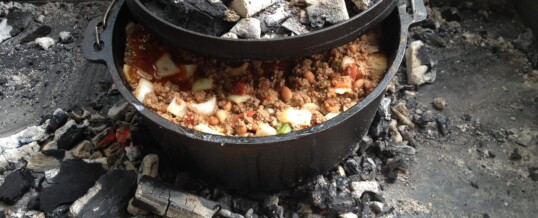
My first exposure to cooking in the great outdoors was in Cub Scouts. I saw biscuits made in a cast iron dutch oven over the coals of a campfire.
Until then, I had no idea that food could come from anywhere else other than mom’s kitchen or the school cafeteria.
Sure, I’d seen my grandfather make hamburgers over charcoal at those little highway roadside parks that the state built in the 50s and 60s, but cooking in dutch ovens was different.
Different to me, anyway. All I’d ever known was a gas stove that came from Sears. So scouting was an eye opener. There was a big difference between a pilot light and a fire pit when cooking your next meal.
Dutch ovens come in all different sizes and are made of cast iron. They have a lipped lid, which allows for coals to be placed on top for heating. Many have three legs, which provides a space to generate heat from beneath the pot.
Before we had ovens from Sears and Roebuck, most families had at least one dutch oven, and they used it to cook, bake, boil, and just about anything else when it came to cooking.
Turns out, dutch ovens were part of what built this country. Our ancestors who first moved to what became the U.S. had to have something durable and reliable to prepare their meals, and dutch ovens fit the bill. They may not have had much else to travel with them as they migrated, but they took their pots.
When you think of cowboys out on the range moving cattle, first thoughts include them huddled around a campfire thanking a guy named “Cookie” for the beans he’s dishing from a cast iron pot onto their plates.
These cast iron vessels were so coveted that they were considered a very valuable part of a person’s estate. George Washington’s mother specified who got hers in her will.
I can hear George’s siblings now:
George’s brother: “Sure, he may be the father of our country, but I got mom’s pot.”
George’s other brother: “Might I borrow it on Thursday? It’s pot luck day at Mt. Vernon.”
George’s brother: “You’re just rubbing it in, aren’t you?”
George’s other brother: “Why, yes.”
I never had a brother, but I did have fellow Cub Scouts, who were glad to treat me like a brother. We all were fascinated with the dutch oven. You could carry it with your gear and if you could build a fire somewhere, you had a way to cook your food.
Many a camp meal was prepared in the ovens, but dessert was always our favorite. Specifically, peach cobbler.
It seemed like a simple thing, but the taste of hot peach cobbler on a cold night is about as close to heaven as you can get.
That memory came back to me after my wife and I bought a homestead out in the country. My mother said she would have never thought of me as someone who’d wind up with land and a tractor, but I did. A yearning to be near nature caught up with me later in life, and cooking outdoors is a natural fit for that lifestyle.
Gas and charcoal grills came with us when we moved to the country, but as I looked across the the bare trees near the pasture one winter it reminded me of scouts.
I acquired a 12-inch dutch oven and dug a hole for a fire. That was my first outdoor cooking since Cub Scouts. I made biscuits.
From there, I received a portable metal table made for dutch oven cooking. It held more than one oven. I learned to stack the ovens to maximize the use of heat. I read books on the subject, and found YouTube videos to teach me more.
Chickens, beef roasts, vegetable dishes, corn casseroles, and many other delicious menu items were cooked in the dutch ovens. Thanksgiving and Christmas were great times for cooking outdoors. The weather is just right, and the mosquitoes are absent.
Most importantly, grandchildren are fascinated by the process and it gives them time with their granddad.
One of the family favorites in dutch oven cooking is chili. I won’t debate the beans vs. no beans argument here, but I will say that you likely won’t find a better tasting chili than a batch from a dutch oven, cooked over coals on our homestead.
I don’t know if our founding fathers ate chili, but I do know that they knew about the importance of knowing how to make a meal in a cast iron pot called, a dutch oven.
Even they knew that, by George.
©2022 John Moore
John’s latest book, Puns for Groan People, and his books, Write of Passage: A Southerner’s View of Then and Now Vol. 1 and Vol. 2, are available on his website – TheCountryWriter.com, where you can also send him a message and hear his weekly podcast.
OCT
2022
